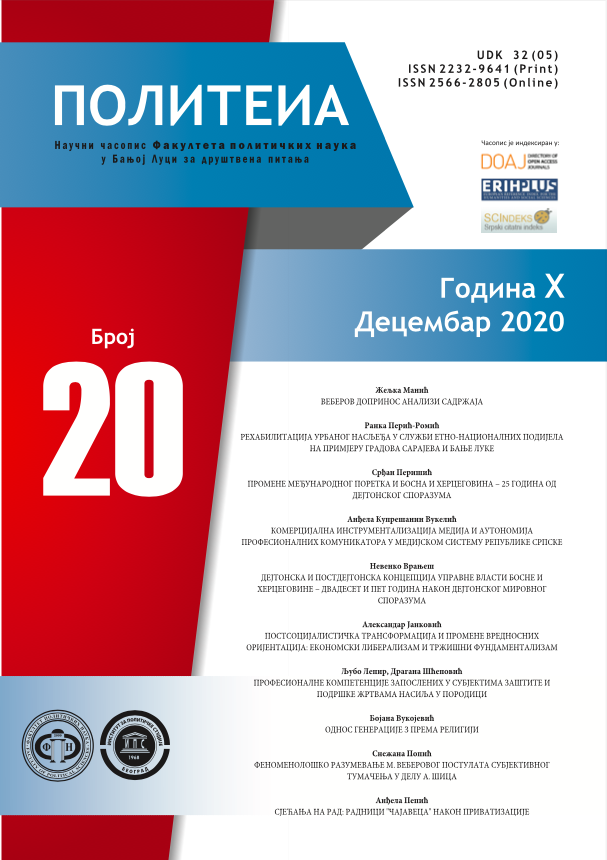REMEMBERING WORK: THE ‘ČAJAVEC’ COMPANY WORKERS AFTER PRIVATISATION
Abstract
The working class was, at least formally, a formative basis of the former Socialist Federative Republic of Yugoslavia (SFRY). The transformation of the system from the Communist to the capitalistic one led to its alienation, poverty, and social exclusion. This transformation, as part of the neoliberal globalisation, occurred through the introduction of the so-called ‘shock therapy’ measures: liberalisation, privatisation, and stabilisation. Large industrial complexes and leading state- owned companies in the SFRY were the subject of, often dubious, privatisation processes. Through such processes, workers, who were once owners and motors of companies they worked at, are now stripped of the ownership and the opportunity to work at the same companies. The majority of research on post-Communist economic transformation focuses on changes to the system, on economic aspects of privatisation processes, and on introduction of market economy. Yet, there are few research focusing on the privatisation and transformation from a workers' perspective. This paper attempts to fill in this gap by providing a different angle to the current studies of transformation of the SFRY and its successor states. Through interviews with former workers of privatised and/or closed factories and industrial complexes (using the local company of ‘Rudi Čajavec’ as an example), the research presented in this paper analyses workers' attitudes and sentiments towards the labour in the Communist Yugoslavia and the labour today, as well as towards the privatisation processes accompanying the latter.The research gives a voice to the workers, and, by looking at the past, gives a worker-centred approach to imagining labour in the future.
References
Agencija za privatizaciju FBiH. (2020). Program rada Agencije za privatizaciju u Federaciji BiH sa planom privatizacije za 2020. godinu. Retrieved from http://www.apf.com.ba/press/izvjestaji/Archive.aspx?template_id=4&langTag=bs-BA&pageIndex=
Arsenijević, D. (2014). Unbribable Bosnia: The Fight for the Commons. Baden-Baden: Nomos.
Calori, A. & Jurkat, K. (2017). ̒ I’m Both a Worker and a Shareholder.’ Workers’ Narratives and Property Transformations in Postsocialist Bosnia-Herzegovina and Serbia. Südosteuropa, 65(4), 654–678. doi: https://doi.org/10.1515/soeu-2017-0043
Cvek, S., Ivčić, S. & Račić, J. (2020). „Zavađene plave kute“: radnički štrajkovi i nacionalizam oko 1990. godine. In O. Obad & Bagarić P. (Eds.), Devedesete. Kratki rezovi (pp. 77-107). Zagreb: Institut za etnologiju i folkloristiku i Jesenski i Turk.
Investiciono-razvojna banka Republike Srpske – baza podataka o privatizaciji u RS (2020). Retrieved from https://www.irbrs.net/Privatizacija/PrivatizacijaRezultatiDB.aspx?tab=0&lang=cir
Kalb, D. & Halmai, G. (Eds) (2011). Headlines of nations, subtexts of class: working-class populism and the return of the repressed in neoliberal Europe. New York/Oxford: Berghan Books.
Kurtović, L. (2015). ‘Who sows hunger, reaps rage’: on protest, indignation and redistributive justice in post-Dayton Bosnia-Herzegovina. Southeast European and Black Sea Studies, 15(4), 639-659, doi: 10.1080/14683857.2015.1126095
Lazic, М. (1996). The breakdown of socialism and changes in the structure of Yugoslav society. International Review of Sociology: Revue Internationale de Sociologie, 6(2), 279-294. doi: 10.1080/03906701.1996.9971202
Lazić, M. (1998). Adaptivna rekonstrukcija elita u post-socijalističkoj Jugoslaviji. Luča, 15(1-2), 59-73.
Majstorović, D., Vučkovac, Z. & Pepić, A. (2015). From Dayton to Brussels via Tuzla: post-2014 economic restructuring as europeanization discourse/practice in Bosnia and Herzegovina. Southeast European and Black Sea Studies, 15(4), 661-682. doi: 10.1080/14683857.2015.1126093.
Mujkić, A. (2019). Ideologija, klasa i pitanje političke subjektivizacije u Bosni i Hercegovini. Politička misao, 56(2), 41-65.
Pepić, A. (2018). Kriza neoliberalne financijalizacije na evropskoj poluperiferiji – prekarnost tržišta rada u Bosni i Hercegovini. Politeia, 8(15), 121-132. doi: 10.5937/politeia0-18791
Petrović, T. (2017). Nostalgia for industrial labor in socialist Yugoslavia or Why the post-socialist affect matters. In M. Velikonja (Ed.), Nostalgia on the move (pp. 14-29). Belgrade: The Museum of Yugoslavia.
Woodward, S. (1995). Socialist Unemployment: The Political Economy of Yugoslavia 1945−1990. Princeton: Princeton University Press.
Yin, R. K. (2003). Case study research: Design and methods (3rd Ed.). London: Sage Publications.
Živković, A. (2015). From the Market...to the Market: The Debt Economy after Yugoslavia. In S. Horvat & I. Štiks (Eds.), Welcome to the desert of post-socialism: radical politics after Yugoslavia (pp. 45-64). London: Verso.
Autori koji objavljuju u ovom časopisu pristaju na sljedeće uslove:
- Autori zadržavaju autorska prava i pružaju časopisu pravo prvog objavljivanja rada i licenciraju ga "Creative Commons Attribution licencom" koja omogućava drugima da dijele rad, uz uslov navođenja autorstva i izvornog objavljivanja u ovom časopisu.
- Autori mogu izraditi zasebne, ugovorne aranžmane za neekskluzivnu distribuciju članka objavljenog u časopisu (npr. postavljanje u institucionalni repozitorijum ili objavljivanje u knjizi), uz navođenje da je članak izvorno objavljen u ovom časopisu.
- Autorima je dozvoljeno i podstiču se da postave objavljeni članak onlajn (npr. u institucionalni repozitorijum ili na svoju internet stranicu) prije ili tokom postupka prijave rukopisa, s obzirom da takav postupak može voditi produktivnoj razmjeni ideja i ranijoj i većoj citiranosti objavljenog članka (Vidi Efekti otvorenog pristupa).

